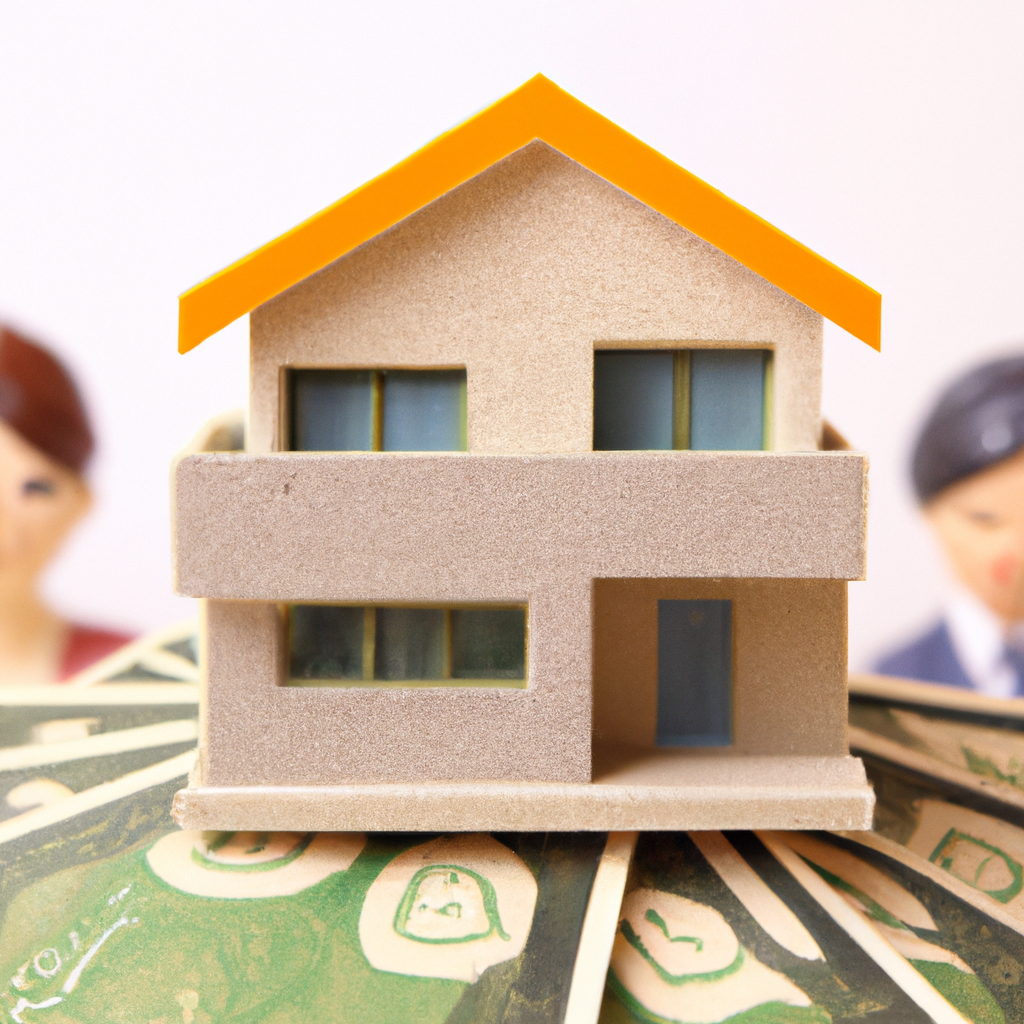
What is a home loan?
A home loan is a loan that helps individuals and families finance the purchase of a home. Home loans can be used to finance the construction of a new home, the purchase of an existing home, or the refinancing of an existing home loan. Home loans can be either fixed-rate or adjustable-rate loans, and may be available with different terms and interest rates.
Features of Home Loan
- Home Loans are offered for the maximum tenure of 30 years
- upto 90% of your Home Loan property value is funded by bank.
- Intrest rate for home loan starts at 8% per annum, it comes to paying emi of 2700/month
- Their is no Prepayment or forclosure charges on the adjustable rate mortgage loan.
- Balance Facility(BT) is available for home loans.
- Top-up-you can get a top up on your home loan .
The types of home loans
There are many different types of home loans available on the market, each with their own unique set of benefits and drawbacks. Here is a brief overview of the most common types of loans:
Fixed-rate mortgages:
As the name suggests, these loans have a fixed interest rate for the duration of the loan, typically 15 or 30 years. This makes them ideal for borrowers who want predictable monthly payments and don’t mind paying a slightly higher interest rate
Loans for Home purchase
For a new house purchase you can avail up to the funding up to 90% of the property value from the Bank
Adjustable-rate mortgages:
These loans have an interest rate that can fluctuate over time, usually in response to changes in the market. This means that your monthly payments could go up or down, making them less predictable than fixed-rate mortgages. However, they typically have lower interest rates than fixed-rate mortgages, making them a good choice for borrowers who are comfortable with a bit of uncertainty.
Home improvement Loan
For renovation of your existing house you can avail home improvement loan
FHA loans:
These loans are backed by the Federal Housing Administration and are available to borrowers with less-than-perfect credit or a limited down payment. They tend to have more relaxed eligibility requirements than other types of loans, but they also come with higher interest rates and fees.
Home Extension Loans
if you are doing some construction /expansion work in your existing house you can avail hime extension loan
Home Construction Loans
As the name suggest this loan fis for the constructionof new house.
Home Loan Balance Transfer(BT)
Balance transfer is a facility provided by banks and other financial institutions where you can transfer your existing loan to the other Bank/Financial institution which offers a lower rate of interest
Loan for Land Purchase
As the name suggest Loan for Land Purchase is for puchasing the land for construction of house, the rate of interest is comparitively higher and Banks fund up to 60-70% of the land price.
Home Loan Top up
After completing certain time of a loan installment tenure you can avail Home Top up loan, Top-up is the additionol loan amount borrowed on your home other than your existing home loan.
Affordable Housing Loan
This Loan is for the urban sector for the funding less than 40 lacs.
Joint Home Loan
This is for increasing the home loan eligibility by adding a earning member of your family as an co-applicant in your loan.
Home Loan for NRI
Non resident indians can also avail a home loan, loan applying procedure is similar to the normal home loan process.
VA loans:
These loans are available to eligible veterans and their spouses and offer 100% financing with no down payment required. They also come with competitive interest rates and flexible repayment options, making them a great choice for military families.
USDA loans:
These loans are available to borrowers in rural areas who have a low or moderate income. They offer 100% financing with no down payment required and come with competitive interest rates.
Conventional loans:
These loans are not backed by the government and tend to have stricter eligibility requirements than other types of loans. However, they usually come with lower interest rates and fees.
Interest rates in different types of housing loans
Interest rates on housing loans differ depending on the type of loan you take out. For example, a fixed-rate loan has an interest rate that remains the same for the life of the loan, while an adjustable-rate loan has an interest rate that can change over time.
Interest rates also differ based on the term of the loan. For example, a 30-year loan will have a lower interest rate than a 12-year loan. And, in general, a shorter-term loan will have a lower interest rate than a longer-term loan.
Finally, your credit score will also affect your interest rate. If you have good credit, you’ll likely qualify for a lower interest rate than someone with bad credit.
So, when you’re shopping for a housing loan, be sure to compare interest rates carefully. This is just one factor that can affect the overall cost of your loan.
| Bank | Interest Rate | Lowest EMI/lakh |
|---|---|---|
| ICICI BANK HOME LOAN | 8.4% | Rs 760 |
| CITYBANK HOME LOAN | 8% | Rs 772 |
| HDFC HOME LOAN | 8.6% | Rs 770 |
| PNB HOUSING FINANCE | 8.5% | Rs 769 |
| BANK OF BARODA HOME LOAN | 8.5% | Rs 769 |
| SBI HOME LOAN | 8.4% | Rs 762 |
| AXIS BANK HOME LOAN | 8.3% | Rs 755 |
| LIC HOUSING FINANCE | 8.3% | Rs 755 |
| SUNDARAM HOME FINANCE | 8.65% | Rs 877 |
| BAJAJ HOME FINANCE | 8.3% | Rs 755 |
What are some other fees associated with housing loans?
In addition to interest, there are other fees you’ll need to pay when you take out a housing loan.
These can include:
Processing fee:
This is a fee charged by the lender for processing your loan application. It’s typically a percentage of the total loan amount, and it can vary from lender to lender.
This is a fee charged by the lender for processing your loan application. It’s typically a percentage of the total loan amount, and it can vary from lender to lender.
Downpayments/Origination fee:
Down-payments are upfront fees that you can pay to get a lower interest rate on your loan.
Mortgage insurance:
If you’re putting less than 20% down on your home, you’ll probably have to pay for mortgage insurance. This protects the lender in case you default on your loan. Mortgage insurance can add several hundred dollars to your monthly payment.
Title Search Fees:
To verify the title from the registrar office through its lawyer the bank charges a fees called as Title search fees.
Appraisal fee:
The lender will want to make sure that the home you’re buying is worth the price you’re paying for it. To do this, they’ll hire an appraiser to give the property a value.
Closing costs:
These are the fees associated with closing on your loan, and they can include things like title insurance, loan processing fees, and appraisal fees. Closing costs can add up to several thousand dollars.
Who is eligible/Documents required for a housing loan?
To be eligible for a housing loan, you must submit following documents-
Eligibility
-Be a citizen of a country or permanent resident
-Be at least 18 years old
-Have a regular income
-Not have any outstanding housing loans or credit facilities with any financial institution
Documents Required
- Identity Proof-Aadhaar card/ Passport /Driving liscence/pan card/voter id/govt id
- Address Proof-Passport /Driving liscence/election id telebone bill/electricity bill.
- Income Proof-form 16, bank statement for 6 months, salary slip.
- Property Documents Required: Possession Letter,conveyance deed, Allotment letter, Sales deed.
What are the steps to apply for a housing loan?
The first step in applying for a housing loan is to meet with a mortgage specialist to discuss your options. They will help you determine how much you can afford to borrow and what kind of interest rate you will be able to get.
Next, you will need to fill out a loan application. This will include information about your income, debts, and assets. The lender will use this information to determine whether or not you are a good candidate for a housing loan.
Once your application is approved, you will need to sign a loan agreement. This document will outline the terms of your loan, including the interest rate, monthly payments, and repayment schedule. Be sure to read over this carefully before signing anything!
Finally, you will need to make a down payment on your new home. The amount of the down payment will vary depending on the lender, but it is typically around 10% of the purchase price. Once everything is finalized, you’ll be on your way to owning your very own home!
How do I know if I qualify for a home loan?
If you’re thinking about buying a home, you may be wondering if you qualify for a home loan. There are a few factors that lenders will consider when determining whether or not you qualify for a loan, including your credit score, employment history, and debt-to-income ratio.
To get an idea of whether or not you might qualify for a home loan, you can check your credit score and get a copy of your credit report. Lenders will also want to see proof of income and employment history, so be sure to have these documents ready when you apply for a loan.
Your debt-to-income ratio is another important factor that lenders will consider. This ratio is calculated by dividing your total monthly debts by your gross monthly income. A higher debt-to-income ratio may make it more difficult to qualify for a loan, so it’s important to try to keep this number low.
If you’re not sure whether or not you qualify for a home loan, the best way to find out is to speak with a lender. They’ll be able to review your financial situation and let you know if you pre-qualify for a loan.
how to apply for a home loan
- check your eligibility
- check the documents required
- decide on home interest rate types by comparing
- contact RAJNEESH SHARMA on myloansoffers.in
Home Loan Process
- Submit the Application form-Application can be submitted personally by visiting branch office or can be submitted online.
- Processing fees payment-processing fees are 0.25% to 0.5% of the loan amount which is to be paid at the time of loan application, you can negotiate the processing fees with your lender.
- Customer Verification-Lender does the customer verification process personally by checking the residence and place of employment check.
- Personal Discussion(PD)-Application Scrutiny and Verification happen next, the lender does a PD(Personal discussion) with the applicant, where the application is evaluated and the lender repayment capacity is ascertained.
- Credit Appraisal-Underwriting process, here the lender decides the exact terms and conditions of your loan, the loan amount to be sanctioned and the rate of interest is decided here.
- Issue of offer letter– The lender issues an offer letter that mentions the amount sanctioned, the rate of interest, and the tenure for which it’s being sanctioned.
- Legal and valuation check– Applicant requires to submit Property Legal documents like search documents, NOC, etc, the lender does the legal checks on the property.
- Document registration-after the legal and valuation check of the property, documents are registered.
- The signing of the Loan Agreement and submission of post-dated cheques-Loan agreement is signed and the required post-dated cheques are submitted.
- Loan Disbursement-after completion of documentation and related formalities, the loan amount is disbursed as per the conditions mentioned in the loan agreement.
Conclusion
Now that you know everything there is to know about housing loans, you can make an informed decision on whether or not this is the right financial move for you. Weigh the pros and cons carefully and consult with a financial advisor if you have any further questions. Remember, taking out a housing loan is a big responsibility – but if you’re smart about it, it can also be a very rewarding one.
Must read: Loan against Property and how does it works
Must read: Top up Home loan
Must read: how is Personal loan approved
FAQ
A housing loan is a type of loan that helps individuals finance the purchase of a home. Housing loans can be used to purchase both new and existing homes, and can be either fixed-rate or adjustable-rate.
Housing loans typically involve the borrowing of a large sum of money from a financial institution, which is then used to purchase a home. The borrower then makes monthly payments to the lender, with interest accruing on the outstanding balance. The loan is typically repaid over a period of 15-30 years.
Housing loans are offered by banks, credit unions, and other financial institutions. In some cases, the government may also offer housing loans through programs like FHA or VA loans.
The terms of housing loans vary depending on the lender and the specific loan program being used. However, most housing loans have terms that include a fixed interest rate and a repayment period of 15-30 years.
[rio-emi-calculator]
| S.NO | BANK NAME/LOAN INSTITUTIONS | PRODUCT | CONTACT PERSON | CONTACT NUMBER |
|---|---|---|---|---|
| 1 | PIRAMAL HSG | HL | RAJNEESH SHARMA | 9560500123 |
| 2 | FULLTERON GRAHSHAKTI | HL/LAP | ||
| 3 | DCB | HL/LAP | ||
| 4 | MONEYWISE FINANCIAL SERVICE | HL/LAP | ||
| 5 | ICICI HFC | HL/LAP | ||
| 6 | UTTKARASH SMALL FINANCE | HL/LAP | ||
| 7 | UMEED FINANCE PVT LTD | HL/LAP | ||
| 8 | ICICI BANK | HL/LAP | ||
| 9 | CAPRI GLOBAL | HL/LAP | ||
| 10 | TATA | HL/LAP | ||
| 11 | DEUTSCHE BANK | HL | ||
| 12 | BANK OF BARODA | HL | ||
| 13 | PIRAMAL | HL | ||
| 14 | IDFC BANK | HL | ||
| 15 | L & T BANK | HL | ||
| 16 | AAVAS | HL/LAP | ||
| 17 | UTTKARESH SMALL FINANCE | HL/LAP | ||
| 18 | PNB HSG | HL/LAP | ||
| 19 | BAJAJ | HL | ||
| 20 | INDOSTAR | HL/LAP | ||
| 21 | SRIRAM HOUSING | HL | ||
| 22 | AXIS FINANCE | HL/LAP | ||
| 23 | HERO HOUSING | HL | ||
| 24 | HSBC | HL | ||
| 25 | ADITYA BIRLA HSG | HL/LAP | ||
| 26 | UJJIVAN SMALL FINANCE | HL/LAP | ||
| 27 | TATA HOUSING EMERGENCY MKT | HL/LAP | ||
| 28 | ART HSG FINANCE | AFFORDABLE | ||
| 29 | KARUR VYASYA | HL/LAP | ||
| 30 | AXIS ASHA | HL | ||
| 31 | DCB BANK | HL/LAP | ||
| 32 | CUX HSG | HL | ||
| 33 | RBL BANK | AFFORDABLE | ||
| 34 | GODREH HSG | LAP | ||
| 35 | PROFECTUS | LAP | ||
| 36 | SCB | LAP | ||
| 37 | HDFC | LAP | ||
| 38 | INDUSIND | LAP | ||
| 39 | ADITYA BIRLA | LAP | ||
| 40 | HERO FINCORDO | LAP | ||
| 41 | FEDRAL BANK | LAP | ||
| 42 | CHOLAMANSALAM | LAP | ||
| 43 | U GROW | LAP | ||
| 44 | IDFC SUVIDHA LOAN | LAP | ||
| 45 | HDB FINANCIAL SERVICES | LAP | ||
| 46 | ANAND RATHI GLOBAL | LAP | ||
| 47 | JANA SMALL FINANCE | LAP | ||
| 48 | ARKA FINCAP | LAP | ||
| 49 | POONAWAL | LAP | ||
| 50 | EDELWEISS | LAP |

